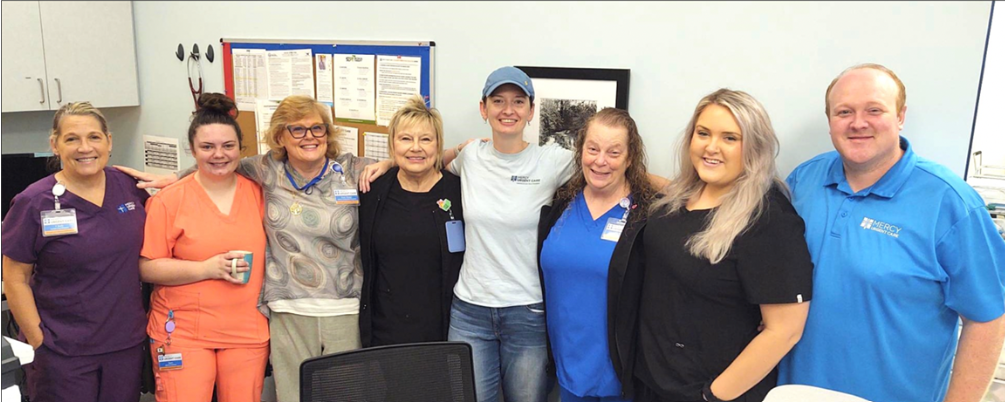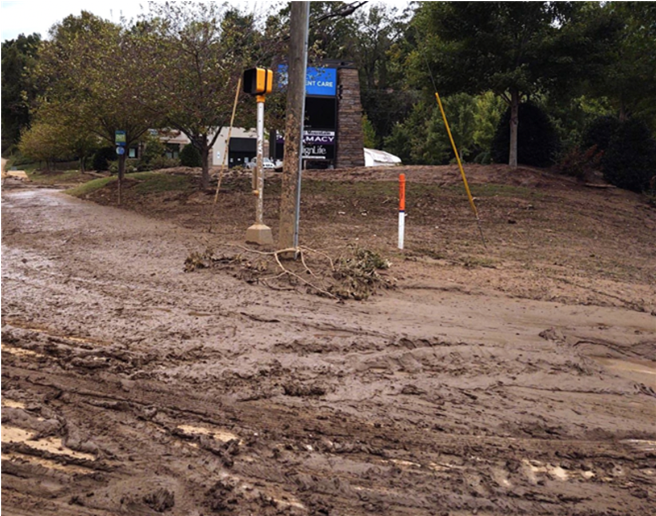share
By Catherine Walsh, features writer
When Hurricane Helene tore across Western North Carolina on Friday, September 27, the torrential rain and destructive wind caused mudslides and flash floods, ravaging mountain communities and killing scores of people and injuring many others. Mercy Urgent Care, a sponsored ministry, was one of the first healthcare organizations to respond—reopening each of its eight clinics as quickly as possible.

Sister Peggy Verstege, who lives in the hard-hit area just north of Asheville and serves as Mercy Urgent Care’s mission effectiveness advisor, said the response of the organization’s staff has been nothing short of “heroic.” In a Zoom conversation last week, she personally thanked the organization’s president and CEO, Rachel Sossoman, for her leadership in the crisis.
Sister Lillian Jordan, a Belmont-based board member of Mercy Urgent Care, also thanked Rachel on the call. “You and your team have been wonderful about keeping us apprised about what is happening. I’m deeply touched by your commitment to Mercy.”
As soon as power was restored, each clinic opened its doors, even if it lacked running water and needed portable toilets.
“People in the community rely on us, and we knew that we had to get our doors open as fast as possible,” Rachel said. Shocked by the storm’s ferocity and dazed by its destruction, she continued, “It looked like an apocalypse.”

She texted her staff—about 140 people—and was relieved to learn that everyone was okay. Their insistence on coming back to work immediately, despite their own losses, moved her. “One woman, who lost her house and her car, said, ‘I want to be here. I want to serve.’ That’s the level of dedication and commitment we have on this team.”
Mercy Urgent Care serves about 80,000 people a year across several rural counties, including Buncombe County, which was the area hardest hit by Hurricane Helene. “To put that number in perspective, the city of Asheville has just over 90,000 people.”
Mercy Urgent Care is taking care of its staff also, paying for days lost due to the storm and providing water and meals when possible, according to Rachel. Generous coworkers with shelter and water have offered them to those who lack them.
Rachel, who joined Mercy Urgent Care in 2015, has led the organization since 2021. “I feel overwhelming gratitude to be part of the Sisters of Mercy during this painful time,” she said. “As a sponsored ministry, we know what we stand for, and that’s to take care of patients and staff in every way we can in this crisis.”
Asheville Mayor Esther E. Manheimer recently sent a personal note of thanks to Mercy Urgent Care for opening its doors so quickly after the hurricane.
The Sisters of Mercy have been serving in Western North Carolina since 1900, when they came to the mountain community to teach but discovered a tuberculosis asylum whose patients had no one to care for them. “The sisters rolled up their sleeves and said, ‘I guess we’re becoming nurses,’” said Peggy, who marked her 40th anniversary of pastoral care in the region last summer. Her ministries include justice issues for immigrants and others suffering from poverty in the region, serving as a board member of the Catherine McAuley MERCY Foundation and volunteering in Jamaica.
Before the sisters sold Saint Joseph’s Hospital in Asheville after nearly a century of care, Sister Veronica Schumacher (d. 1999), the administrator, saw a need for community-based health care, especially for those who are poor.
“She was a visionary who knew there needed to be another way to provide medical care that wasn’t the emergency room. She and a group of doctors opened some of the first urgent care centers in the country,” said Sister Peggy, who knew Sister Veronica. That was in 1985. Since then, Mercy Urgent Care has provided health care to people from all backgrounds regardless of ability to pay.
“Right now, we’re not collecting payments from people who don’t have money, even though we’re running at a loss,” said Rachel. “We must see patients who need us and trust that we will figure out ways to make our organization financially whole again as we do the right thing. It’s who we are as a Mercy organization. We run towards danger, not away from it, just as the Sisters of Mercy did when they came to Asheville in 1900 and cared for tuberculosis patients.”
Such dedication is an inspiration, said Sister Lillian, who has served for decades in Kentucky, West Virginia and North Carolina, where she is Sacred Heart Convent administrator. “I’m moved that for Rachel and her staff, working at Mercy Urgent Care isn’t just a job, but also a life of service. It’s about bringing Mercy to people most in need, especially in a time of crisis like Hurricane Helene.”